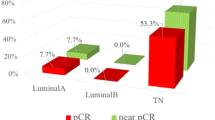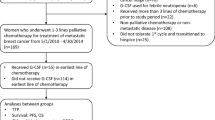Abstract
Background
This retrospective study was undertaken to define risk factors for reductions in dose intensity of adjuvant chemotherapy in women with early stage breast cancer (ESBC).
Methods
A nationwide survey of 190 community oncology practices was conducted between 1998 and 2002 with data collected retrospectively on 3,707 patients treated with adjuvant chemotherapy for ESBC. End points included reductions in dose intensity, delivered relative dose intensity (RDI) <85%, and the incidence of chemotherapy dose delays ≥7 days and dose reduction ≥15%. Demographic and clinical characteristics, incidence of febrile neutropenia (FN), and patterns of use of granulocyte colony-stimulating factor (G-CSF) were also assessed.
Results
Average RDI for all regimens was 88%, with 30% of patients receiving <85% of standard for their regimen. Seventeen percent of the reduction in average RDI was planned from the start of therapy, and 13% was unplanned. In univariate analysis, significant predictors of reduced RDI were: age ≥65 years (41%, P < 0.001), body surface area (BSA) >2 m2 (37%, P < 0.001), negative lymph nodes (33%, P < 0.001), FN (36%, P = 0.013), and comorbidities (40%, P = 0.013), particularly renal disease (86%, P = 0.004). Dose reduction was less with prophylactic G-CSF (24%, P < 0.001). In multivariate analysis, significant independent predictors of reduced RDI included: advanced age, greater BSA, comorbidities, anthracycline-based regimens, a 28-day schedule and FN, while primary G-CSF prophylaxis was associated with a significant reduction in risk.
Conclusion
A significant proportion of patients with potentially curable ESBC continue to experience planned and unplanned reductions in RDI.
Similar content being viewed by others
References
Early Breast Cancer Trialists’ Collaborative Group (EBCTCG) (2005) Effects of chemotherapy and hormonal therapy for early breast cancer on recurrence and 15-year survival: an overview of the randomized trials. Lancet 365:1687–1717
Bonadonna G, Valagussa P, Moliterni A et al (1995) Adjuvant cyclophosphamide, methotrexate, and fluorouracil in node-positive breast cancer: the results of 20 years of follow-up. N Engl J Med 332:901–906
Wood WC, Budman DR, Korzun AH et al (1994) Dose and dose intensity of adjuvant chemotherapy for stage II, node-positive breast carcinoma. N Engl J Med 330:1253–1259
Budman DR, Berry DA, Cirrincione CT et al (1998) Dose and dose intensity as determinants of outcome in the adjuvant treatment of breast cancer. J Natl Cancer Inst 90:1205–1211
Piccart MJ, Biganzoli L, Di Leo A (2000) The impact of chemotherapy dose density and dose intensity on breast cancer outcome: what have we learned? Eur J Cancer 36(Suppl 1):S4–S10
Chang J (2000) Chemotherapy dose reduction and delay in clinical practice: evaluating the risk to patient outcome in adjuvant chemotherapy for breast cancer. Eur J Cancer 36(Suppl 1):S11–S14
Adjuvant therapy for breast cancer (2000) NIH Consensus Statement 17:1–35
Citron ML, Berry DA, Cirrincione C et al (2003) Randomized trial of dose-dense versus conventionally scheduled and sequential versus concurrent combination chemotherapy as postoperative adjuvant treatment of node-positive primary breast cancer: first report of Intergroup trial C9741/Cancer and Leukemia Group B trial 9741. J Clin Oncol 21:1431–1439
Lyman GH, Dale DC, Crawford J (2003) Incidence and predictors of low dose-intensity in adjuvant breast cancer chemotherapy: a nationwide study of community practices. J␣Clin Oncol 21:4524–4531
Lyman GH, Dale DC, Friedberg J et al (2004) Incidence and predictors of low chemotherapy dose-intensity in aggressive non-Hodgkin’s lymphoma: a nationwide study. J Clin Oncol 22:4302–4311
Dale DC, McCarter GC, Crawford J et al (2003) Myelotoxicity and dose intensity of chemotherapy: reporting practices from randomized clinical trials. JNCCN 1:440–454
Harlan LC, Clegg LX, Abrams J et al (2006) Community-based use of chemotherapy and hormonal therapy for early-stage breast cancer: 1987–2000. J Clin Oncol 24:872–877
Mayers C, Panzarella T, Tannock IF (2001) Analysis of the prognostic effects of inclusion in a clinical trial and of myelosuppression on survival after adjuvant chemotherapy for breast carcinoma. Cancer 91:2246–2257
Cameron DA, Massie C, Kerr G et al (2003) Moderate neutropenia with adjuvant CMF confers improved survival in early breast cancer. Br J Cancer 89:1837–1842
Saarto T, Blomqvist C, Rissanen P et al (1997) Haematological toxicity: a marker of adjuvant chemotherapy efficacy in stage II and III breast cancer. Br J Cancer 75:301–305
Colleoni M, Price K, Catigione-Gertsch M et al (1998) Dose-response effect of adjuvant cycloposphamide, methotrexate, 5-fluorouracil (CMF) in node-positive breast cancer. Eur J Cancer 34:1693–1700
Bonneterre J, Roche H, Kerbrat P et al (2005) Epirubicin increases long-term survival in adjuvant chemotherapy of patients with poor-prognosis, node-positive, early breast cancer: 10-year follow-up results of the French adjuvant study group 05 randomized trial. J Clin Oncol 23:2686–2693
Hudis C, Citron M, Berry D et al (2005) Five year follow-up of INT C9741: dose-dense chemotherapy is safe and effective. Breast Cancer Res Treat 94:S20
Moliterni A, Bonadonna G, Valagussa P et al (1991) Cyclophosphamide, methotrexate, and fluorouracil with and without doxorubicin in the adjuvant treatment of resectable breast cancer with one to three positive axillary nodes. J Clin Oncol 9:1124–1130
Bonadonna G, Brusamolino E, Valagussa P et al (1976) Combination chemotherapy as an adjuvant treatment in operable breast cancer. N Engl J Med 294:405–410
Buzdar AU, Hortobagyi GN, Kau S-W (1990) Doxorubicin-containing adjuvant therapy for patients with stage II breast cancer: MD Anderson Cancer Center experience. In: Salmon SE (eds) Adjuvant therapy of cancer VI. WB Saunders Co, Philadelphia, PA, pp 210–215
Fisher B, Brown AM, Dimitrov NV et al (1990) Two months of doxorubicin-cyclophosphamide with and without interval reinduction therapy compared with 6 months of cyclophosphamide, methotrexate, and fluorouracil in positive-node breast cancer patients with tamoxifen-non-responsive tumors: Results from the National Surgical Adjuvant Breast and Bowel Project B-15. J Clin Oncol 8:1483–1496
Henderson IC, Berry DA, Demetri GD et al (2003) Improved outcomes from adding sequential paclitaxel but not from escalating doxorubicin dose in an adjuvant chemotherapy regimen for patients with node-positive primary breast cancer. J Clin Oncol 21:976–983
Acknowledgments
The ANC Study Group receives research support from Amgen.
Author information
Authors and Affiliations
Consortia
Corresponding author
Rights and permissions
About this article
Cite this article
Shayne, M., Crawford, J., Dale, D.C. et al. Predictors of reduced dose intensity in patients with early-stage breast cancer receiving adjuvant chemotherapy . Breast Cancer Res Treat 100, 255–262 (2006). https://doi.org/10.1007/s10549-006-9254-4
Received:
Accepted:
Published:
Issue Date:
DOI: https://doi.org/10.1007/s10549-006-9254-4




